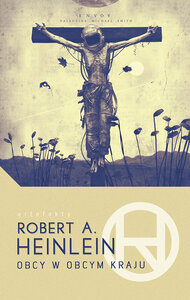Take a photo of a barcode or cover
I considered this as one of my all-time favorite books at one time. This audiobook left me cold. May try reading a print copy to see if I've changed too much to enjoy it or if I just hate the narrator.
I'm not sure how to review this book. I'm glad I read it but it's different than other sci-fi books I've read and it's hard to explain why. It's very existential.
funny
mysterious
fast-paced
Plot or Character Driven:
A mix
Strong character development:
Complicated
Loveable characters:
Complicated
Diverse cast of characters:
No
Flaws of characters a main focus:
Complicated
This was a huge disappointment. It starts off with an interesting concept, an unusual and sympathetic central character, and some action.
It devolves quickly into a rambling mess of outdated, prejudicial thinking. Some of that may be excused by the time in which it was written. Heinlein can only conceive of working women being nurses, secretaries and strippers, who can be told to shut up when men are talking. All politicians, business men, doctors, academics are men. The only POC character is nicknamed 'Stinky' and mocked for his Islamic faith. There are off-hand remarked about Hinduism and Chinamen, homosexuality is deemed unthinkably awful and at one point a character says that anyone who isn't a macho man or feminine woman is a 'poor in between' whose life should probably be ended. As I quoted in a previous comment, a female character says that "Nine times out of ten if a girl gets raped she's partly to blame". The women are all girls, and much is made of the difference between ladies and women.
Swift's Gulliver's Travels is referred to at one point, and it's clear that this is meant to be a similar satire on modern western values. Politics, religion and journalism are among the subjects discussed and parodied. Then it all devolves into rambling conversations, an obsession with sex, and an unpleasant, rude old man who we are invited to view as wise and charming. He's used as a mouthpiece for some pompous artistic opinions among other things.
The worst part is that the glorious liberation which the Man from Mars gifts to Earth is all exploitative sex of the '60s Free Love variety, where consent issues aren't taken seriously, and anyone who isn't into the orgies hasn't been enlightened yet, but can be cured of prissiness and frigidity. The authorial ideas reminded me of those old male art teachers who used to tell the pretty teen students that the problems with their art were down to them being virgins - a condition which the lecherous lecturer would be willing to cure for them.
It devolves quickly into a rambling mess of outdated, prejudicial thinking. Some of that may be excused by the time in which it was written. Heinlein can only conceive of working women being nurses, secretaries and strippers, who can be told to shut up when men are talking. All politicians, business men, doctors, academics are men. The only POC character is nicknamed 'Stinky' and mocked for his Islamic faith. There are off-hand remarked about Hinduism and Chinamen, homosexuality is deemed unthinkably awful and at one point a character says that anyone who isn't a macho man or feminine woman is a 'poor in between' whose life should probably be ended. As I quoted in a previous comment, a female character says that "Nine times out of ten if a girl gets raped she's partly to blame". The women are all girls, and much is made of the difference between ladies and women.
Swift's Gulliver's Travels is referred to at one point, and it's clear that this is meant to be a similar satire on modern western values. Politics, religion and journalism are among the subjects discussed and parodied. Then it all devolves into rambling conversations, an obsession with sex, and an unpleasant, rude old man who we are invited to view as wise and charming. He's used as a mouthpiece for some pompous artistic opinions among other things.
The worst part is that the glorious liberation which the Man from Mars gifts to Earth is all exploitative sex of the '60s Free Love variety, where consent issues aren't taken seriously, and anyone who isn't into the orgies hasn't been enlightened yet, but can be cured of prissiness and frigidity. The authorial ideas reminded me of those old male art teachers who used to tell the pretty teen students that the problems with their art were down to them being virgins - a condition which the lecherous lecturer would be willing to cure for them.
adventurous
lighthearted
medium-paced
Heinlein's second most famous work is still worth reading for fans of the genre, but it's deeply flawed in ways that aren't really overcome for the benefits unless you're a pretty particular sort of person. It's clear how it captured the zeitgeist of the time, which is impressive given it was mostly written some time before its publication. The main problem is he really doesn't seem to make much of the ideas he introduces: to grok is no more than a stand-in for understanding that hints at some deep, fine distinction between cultures without ever really explicating it, for example. This is emblematic of the general frustration. Heinlein really wants to lean into free love, religious transcendentalism, etc., and that's all good and well, but when it's presented by know-it-all Jubal in equal parts dismissiveness and arrogance or else Mike with obfuscated allusions. The overall structure actually works fairly well, but it drags for what little it actually ends up tactfully conveying.
adventurous
mysterious
slow-paced
Plot or Character Driven:
A mix
Strong character development:
Yes
Loveable characters:
Yes
Diverse cast of characters:
Yes
Flaws of characters a main focus:
Yes
This review is for the 1991 re-release, which is the original manuscript before the publisher demanded edits for the original 1961 release. It adds about 150 pages that may or may not be worth it.
This is my second Heinlein novel (the first being “To Sail Beyond the Sunset”) and while I like this one more, I still can’t say I enjoyed it much. Both novels have the similar themes of an elevated society within our own that is founded on sexual promiscuity, here culminating in a quasi-religious cult with cannibalism thrown in (and in “Sunset”, in a woman finally bedding her own father). The good thing about these themes is it forces you to analyze your own perspectives and determine where your morals come from. The bad thing is reading 500 pages from these perspectives makes you feel a bit insane by the end.
The final parallel I will draw between this and “Sunset” is the aged character who explains the world to the other characters, who accept the diatribes as law. There is no difference of opinion at this point, everyone must accept this older and more educated character as understanding the world at an elevated level.
This novel can be broken into two parts: one, when our man from mars is brought back to earth and cannot interact with the world around him; and two, where he has begun to “grok” human society and finds his role. The first part is interesting, a sort of political thriller as our human protagonists save and gain effective control of the man from mars, an undeniable asset. The second is where the quasi-religious, “elevated” society is explained to the reader where all the stakes are gone and we are left with the humor and occasionally draining perspectives of our characters. If you couldn’t tell yet, I found the first half enjoyable and the second exhausting. Try it for yourself if you’re interested but I’ve found that science fiction has progressed significantly in the 60 years since this was first written.
This is my second Heinlein novel (the first being “To Sail Beyond the Sunset”) and while I like this one more, I still can’t say I enjoyed it much. Both novels have the similar themes of an elevated society within our own that is founded on sexual promiscuity, here culminating in a quasi-religious cult with cannibalism thrown in (and in “Sunset”, in a woman finally bedding her own father). The good thing about these themes is it forces you to analyze your own perspectives and determine where your morals come from. The bad thing is reading 500 pages from these perspectives makes you feel a bit insane by the end.
The final parallel I will draw between this and “Sunset” is the aged character who explains the world to the other characters, who accept the diatribes as law. There is no difference of opinion at this point, everyone must accept this older and more educated character as understanding the world at an elevated level.
This novel can be broken into two parts: one, when our man from mars is brought back to earth and cannot interact with the world around him; and two, where he has begun to “grok” human society and finds his role. The first part is interesting, a sort of political thriller as our human protagonists save and gain effective control of the man from mars, an undeniable asset. The second is where the quasi-religious, “elevated” society is explained to the reader where all the stakes are gone and we are left with the humor and occasionally draining perspectives of our characters. If you couldn’t tell yet, I found the first half enjoyable and the second exhausting. Try it for yourself if you’re interested but I’ve found that science fiction has progressed significantly in the 60 years since this was first written.
I was really looking forward to reading this book, this seminal class of science fiction, but I was really dissapointed. I found this to be full of exposition and diatribes about space exploration, religion and philosophy, and very lightweight on story telling and character development. Valentine Michael Smith began an incredibly interesting character, a human raised on Mars who has returned to Earth, but over time he became a figure in the distance. While the early part of the novel is truly fascinating in many ways, especially as Michael learns the ways of Earth culture and indeed expresses his Martian ideas and, um, actions, as the story goes on it becomes clear this book is more about Heinlein's ideas of Mars exploration, religion and politics. This is my second Heinlein book. The first one was Starship Troopers and I really enjoyed that. I hope the others are more on that level than this overhyped mess.
Mixed feelings here. The first half of the book reads like a suspenseful mystery/action flick with some sharp observations about language and culture clashes. And I loved it. The second half deals with whacky religion and uninhibited sex. Public nudity, open marriage, sex used for growing closer - it's all very out there and provocative, especially for 1960s. But since it's 1960 you also get a fair share of sexism. Women are often excluded from male conversations, patronised: "girl", "dearest", "child" - that's apparently the way to talk to a grown woman; and given the roles of caretakers only - cooks, secretaries and nurses. And of course the heights of their ambitions outside the church is marriage, within the church there's no place for ambitions but sex with holy people*.
So yeah, Heinlein made my inner feminist groan a lot. "Nine times out of ten, if a girl gets raped, it's partly her fault." - charming, isn't he? And don't even get me started on his ideas about religion... But the book gives plenty food for thought, technology and gadgets aren't as outdated as you'd think, and the conspiracy plot was truly gripping. So Stranger in a Strange Land - despite being irritating and infuriating at times, was never a waste of time. And I think I grok it.
______________________________________
Does that sound Mormon like to you Gretchen? I know little about Mormons, I doubt they are that extreme, but I kept imagining them as I read. And I guess they do stick with that outdated, little sexist attitude towards women. So your friend's mother definitely has a point.
So yeah, Heinlein made my inner feminist groan a lot. "Nine times out of ten, if a girl gets raped, it's partly her fault." - charming, isn't he? And don't even get me started on his ideas about religion... But the book gives plenty food for thought, technology and gadgets aren't as outdated as you'd think, and the conspiracy plot was truly gripping. So Stranger in a Strange Land - despite being irritating and infuriating at times, was never a waste of time. And I think I grok it.
______________________________________
Does that sound Mormon like to you Gretchen? I know little about Mormons, I doubt they are that extreme, but I kept imagining them as I read. And I guess they do stick with that outdated, little sexist attitude towards women. So your friend's mother definitely has a point.
adventurous
challenging
dark
tense
slow-paced
Plot or Character Driven:
Character
Strong character development:
Yes
Loveable characters:
Complicated
Diverse cast of characters:
No
Flaws of characters a main focus:
Complicated
At times I was uncomfortable with the way the women were being treated in the book. But as I continued forward I realized the book was a satire poking at religious extremism.
Graphic: Confinement, Cursing, Death, Drug abuse, Drug use, Genocide, Gun violence, Infidelity, Mental illness, Misogyny, Panic attacks/disorders, Racism, Sexism, Forced institutionalization, Xenophobia, Police brutality, Medical content, Cannibalism, Religious bigotry, Death of parent, Murder, Pregnancy, Cultural appropriation, Gaslighting, Alcohol, Colonisation, War




